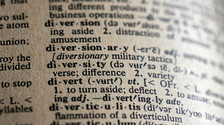amethyst
What's the difference between I was and I were?
8 sept. 2024 10:34
Réponses · 6
2
In most cases, this is an example of the Subjunctive Mood. Commonly, it is used in the Second Conditional (If+past, past modal+base) to represent a hypothetical or imaginary situation, often to give advice or suggestions.
If I were you, I would avoid going to the dangerous part of town.
8 sept. 2024 11:00
2
I was = past simple. I was happy, I was tired etc
I were = part of the conditional tense. If I were you, I would be happy. If I were an Italian, I’d love pizza.
8 sept. 2024 10:56
1
They mean pretty much the same thing, but are typically used in different types of sentences, just to make the grammar work.
Poorly educated native speakers often use "I was" for everything".
Well educated speakers typically use "I were" for hypothetical/theoretical situations. For example:
If I were older, I would probably be wiser.
Do you wish I were wiser?
Scholars call this the "subjunctive mood".
8 sept. 2024 11:09
"were" is called "past subjunctive mood", although the name is misleading because it has nothing at all to do with past. It never conjugates: I were, he were, they were, we were, it were, one were, some were, none were, etc.
8 sept. 2024 14:59
The difference between "I was" and "I were" lies in how they are used in different grammatical contexts. Here's a breakdown:
1. "I was" (Indicative Mood - for statements of fact):
- "I was" is used in the past tense to describe something that actually happened.
- Example: *I was at the party last night.* (This is a factual statement about the past.)
2. "I were" (Subjunctive Mood - for hypothetical or unreal situations):
- "I were" is used in the subjunctive mood to describe hypothetical or unreal situations, particularly after "if" or "wish."
- Example: *If I were you, I would take the job.* (This is a hypothetical situation, not something that actually happened.)
- Example: *I wish I were taller.* (This is an unreal situation, something that isn't true but is wished for.)
Summary:
- "I was" is used for real, factual events in the past.
- "I were" is used for hypothetical, unreal, or wished-for situations, often in conditional or wishful statements.
9 sept. 2024 10:39
Vous n'avez pas encore trouvé vos réponses ?
Écrivez vos questions et profitez de l'aide des locuteurs natifs !
amethyst
Compétences linguistiques
Anglais, Turc
Langue étudiée
Anglais
Articles qui pourraient te plaire

Traveling for Business: Tips, Tricks, and Essential Advice
7 j'aime · 1 Commentaires

How Listening Twice Can Boost Your English Skills
17 j'aime · 9 Commentaires

Top 6 Mistakes to Avoid with Vocabulary Acquisition
55 j'aime · 17 Commentaires
Plus d'articles
